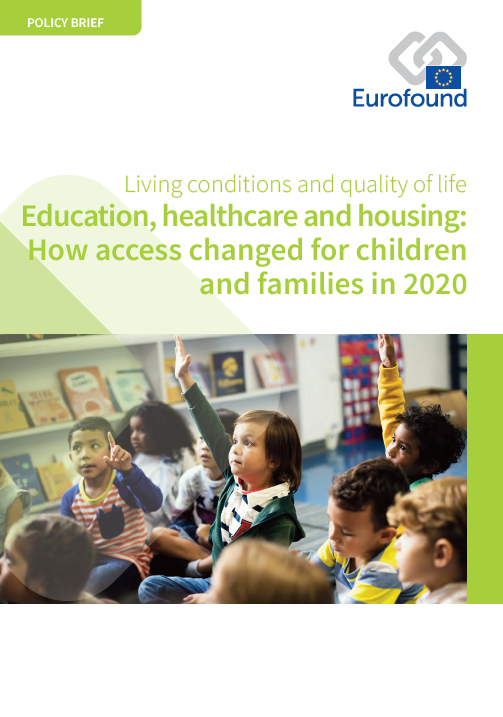The COVID-19 pandemic has had a dramatic impact on the accessibility of health, education and care services for all Europeans. This is also the case for children, who in several countries have seen their schools closed and replaced with remote learning. They have been affected, too, by the pandemic’s negative impact on their families’ access to healthcare and their mental health. Many families have also experienced rising housing insecurity. The Child Guarantee aims to ensure access to these resources for children in need.
Over 2020, Eurofound gathered wide-ranging data on Europeans’ lives during the pandemic. Based on this data, this policy brief documents changes in the accessibility of education, healthcare and housing in the EU27 between 2018–2019 and the summer of 2020, so that these developments can be taken into account when designing policy responses and mitigating measures.
Key findings
Informal care and education duties increased for all parents during the pandemic but especially for women and single parents. Single mothers with children under 12 spent more hours per week caring for children in this period than parents in any other types of households.
The educational supports put in place during the pandemic to facilitate online schooling were widespread in primary and secondary education but were not found to be satisfactory by most Europeans.
The life satisfaction reported by families in 2020 was lower than in households without children. Data prior to the COVID-19 outbreak show the reverse – higher life satisfaction among those with children. This suggests a deterioration of the mental health of families during the pandemic, perhaps as a consequence of increased childcare and education duties taken on by parents.
Europeans with children in their household reported a greater use of healthcare services delivered online or by telephone than those without.
The proportion of single parents reporting arrears in both rent or mortgage repayments and utility bills was approximately twice the average of the total population.
List of tables and graphs
- Table 1: Proportion of people reporting arrears, by household type, EU27, 2019 and July 2020
- Figure 1: Percentage of children cared for by formal arrangements for 1 to 29 hours a week, by age group, EU27 and Member States, 2019
- Figure 2: Average hours per week spent caring for and educating children or grandchildren, EU27, July 2020
- Figure 3: Average hours per week spent caring for or educating children or grandchildren, Member States, July 2020
- Figure 4: Support received for online schooling of children (%), EU27, July 2020
- Figure 5: Views about online schooling for children (%), EU27, July 2020
- Figure 6: Use of healthcare services since the pandemic began (%), by household type, EU27, July 2020
- Figure 7: Percentage of respondents reporting housing security, EU27 and Member States, July 2020
- Number of pages
-
24
- Reference nº
-
EF21012
- ISBN
-
978-92-897-2156-1
- Catalogue nº
-
TJ-AR-21-001-EN-N
- DOI
-
10.2806/736727
- Permalink
Cite this publication
Eurofound (2021), Education, healthcare and housing: How access changed for children and families in 2020, Publications Office of the European Union, Luxembourg.

